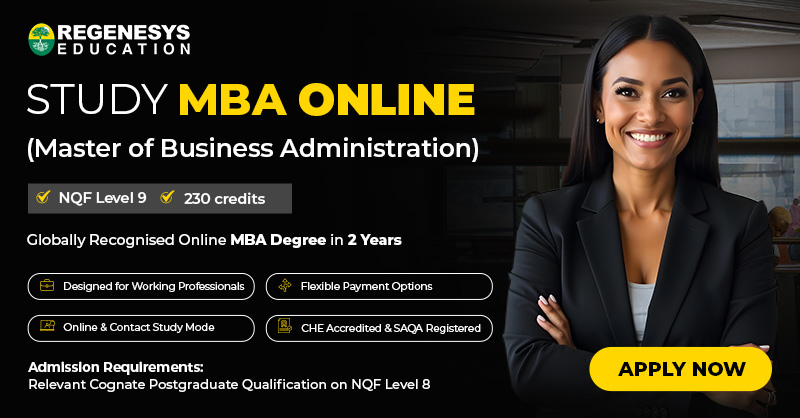Innovation and entrepreneurship are key drivers of growth and competitiveness in today’s economy. As industries adapt to new technologies, shifting customer needs and emerging markets, opportunities for professionals to make an impact through creative ventures continue to grow. Pursuing an MBA in innovation and entrepreneurship offers a powerful pathway for aspiring founders, corporate innovators and specialists in areas like AI and tech ventures.
South Africa has become a rising hub for entrepreneurial activity, blending established industries, fast-growing startups and supportive initiatives. This environment offers fertile ground for developing innovative business models and showcases inspiring MBA success stories in South Africa.
The October 2025 MBA intake is ideal for mid-career professionals and aspiring entrepreneurs, aligning studies with business cycles and enabling customised pathways. This blog explores why this specialised MBA is gaining popularity, the advantages of studying in South Africa and how the Regenesys MBA innovation programme supports ambitious professionals.
Table of Contents
- Why an MBA in Innovation and Entrepreneurship Matters Today
- Key Benefits of an MBA in Innovation South Africa
- October Intake Advantage for Future Entrepreneurs
- Specialised Modules in Entrepreneurship MBA
- MBA for Startup Founders vs Corporate Innovators
- Building Networks Within the Innovation Ecosystem in South Africa
- Regenesys MBA Innovation: A Catalyst for Entrepreneurial Careers
- Conclusion
- MBA in Innovation and Entrepreneurship – FAQ

Why an MBA in Innovation and Entrepreneurship Matters Today
The rise of disruptive startups and transformative corporate initiatives has made it essential for professionals to build a strong foundation in innovative business practices. An MBA in innovation and entrepreneurship equips individuals with the tools required to identify opportunities, design scalable solutions, and adapt to unpredictable market conditions. Whether you are aiming to pivot into entrepreneurship or advance within a corporate innovation team, this programme addresses both contexts effectively.
Here are the key reasons why this qualification matters today:
- Adapting to market disruptions- Industries like fintech, renewable energy, and AI are experiencing rapid change. Professionals equipped with entrepreneurial thinking can help organisations pivot strategies and stay competitive amidst uncertainty.
- Bridging the gap between vision and execution – A specialised MBA not only nurtures creativity but also trains you to transform ideas into actionable business models, making it highly relevant for those seeking an MBA for startup founders.
- Appeal for risk-takers – Individuals seeking an MBA for risk-takers value the programme’s focus on resilience and problem-solving, helping them navigate the inherent uncertainties of starting and scaling ventures.
Key Benefits of an MBA in Innovation South Africa
Choosing to study an MBA in innovation in South Africa provides unique advantages. The region combines dynamic emerging markets with established corporate sectors, creating opportunities for professionals to learn from diverse contexts. Additionally, access to funding networks, incubators, and accelerators offers practical pathways to test and grow entrepreneurial ideas.
Here are the primary benefits:
- Access to funding and mentorship – South Africa hosts numerous venture capital firms and innovation hubs, enabling students to connect with mentors who support MBA for SA startups. This exposure provides practical insight into funding processes and growth strategies.
- Global and local relevance – The programme prepares graduates to address both South African market needs and global opportunities. Case studies often reflect regional realities, making it easier to relate theory to practice.
- Balancing startup vs corporate choices – Many students face the decision of pursuing a startup vs a corporate MBA path. This specialisation allows you to explore both options before committing, equipping you for diverse career outcomes.
Also read – Best MBA Specialisations for Working Professionals
October Intake Advantage for Future Entrepreneurs
The MBA October intake 2025 is strategically aligned with mid‑year career planning and business development cycles. For professionals exploring entrepreneurship or considering a pivot into innovation-led roles, this timing can provide significant benefits. Unlike traditional February intakes, the October session caters to individuals seeking flexibility and immediate application of skills to ventures or corporate projects.
The advantages of the October intake include:
- Flexible transition planning – The October timeline helps professionals align studies with personal and professional transitions, such as exiting a role or launching a business. This is especially relevant for those pursuing an MBA for tech entrepreneurs.
- Immediate integration of learning – Students can apply concepts like lean startup methodology or design thinking in real-time, benefiting early-stage ventures that require iterative approaches.
- Reduced competition for resources – Joining in October often means smaller cohorts, enabling better access to faculty guidance, peer collaboration, and accelerator opportunities.

Specialised Modules in Entrepreneurship MBA
Specialisation is at the heart of an MBA in innovation and entrepreneurship, with tailored modules that address the needs of aspiring founders and corporate innovators alike. These modules help students develop capabilities to identify gaps, create disruptive business models, and scale ventures effectively.
Key entrepreneurship MBA modules include:
- MBA business model innovation – This module explores frameworks like the Business Model Canvas, enabling students to design and refine scalable models. It is particularly beneficial for professionals undertaking an MBA course for founders aiming to launch new ventures.
- Leadership and risk management – Courses prepare individuals to lead teams under uncertainty, a critical skill for those pursuing an MBA for risk takers in volatile markets.
- Digital transformation and AI integration – For those interested in an MBA for AI professionals, this module bridges entrepreneurial thinking with cutting-edge technologies driving innovation across industries.
You may also like to read – October vs February MBA Intake in South Africa
MBA for Startup Founders vs Corporate Innovators
Professionals considering an MBA in entrepreneurship often debate whether to pursue startup ventures or focus on corporate innovation roles. Each path demands distinct skills but shares the core requirement of creativity and strategic insight.
Here are some differentiating factors:
- Startup founders – Individuals pursuing an MBA for startup founders typically value agility, resourcefulness, and the ability to scale ideas quickly. The MBA equips them to manage funding, navigate regulatory landscapes, and lead multidisciplinary teams.
- Corporate innovators – For those choosing a startup vs a corporate MBA path, the programme provides frameworks to drive innovation within established organisations. These roles often focus on intrapreneurship, requiring collaboration with multiple departments.
- Hybrid professionals – Many graduates blend both approaches, moving between entrepreneurial ventures and corporate roles. This flexibility is particularly relevant for the MBA for tech entrepreneurs seeking diverse opportunities.
Building Networks Within the Innovation Ecosystem in South Africa
Networking is a cornerstone of entrepreneurial success, and the innovation ecosystem in South Africa provides abundant opportunities to build valuable connections. From venture capitalists to accelerators and alumni groups, this network enhances career prospects for students pursuing an MBA in innovation and entrepreneurship.
Key networking benefits include:
- Engagement with accelerators and incubators – These organisations support MBA for SA startups by providing mentorship, funding, and co‑working spaces, enabling students to refine and launch their ventures.
- Alumni mentorship opportunities – Graduates from leading programmes often play active roles in mentoring new students, sharing insights from MBA success stories in South Africa and offering guidance on overcoming common challenges.
- Global scaling potential – Networking also extends beyond local borders, equipping graduates to take South African innovations to international markets, aligning with MBA business model innovation strategies.
Read more – Why the October MBA Intake 2025 is a Smart Move for Applicants
Regenesys MBA Innovation: A Catalyst for Entrepreneurial Careers
The Regenesys MBA innovation programme stands out for its customisable electives, focus on leadership, and integration of entrepreneurial thinking. Designed to meet the needs of both founders and corporate innovators, it emphasises flexibility and relevance to real-world challenges.
Key strengths of the Regenesys MBA programme include:
- Tailored electives and focus areas – Students can align their studies with personal interests, choosing modules relevant to the MBA for entrepreneurs or those exploring corporate innovation pathways.
- Practical online delivery – The online format ensures accessibility for professionals worldwide, making it easier to pursue an online MBA in innovation and entrepreneurship without relocating.
- Recognition in top roles – The programme is widely acknowledged for preparing graduates for top MBA roles in South Africa, including leadership positions in startups, corporates, and innovation hubs.

Conclusion
Pursuing an MBA in innovation and entrepreneurship is more than an academic decision; it is a strategic investment in your career. It equips professionals with the skills to navigate disruptive markets, design scalable ventures, and contribute meaningfully to both startups and established organisations. South Africa’s growing innovation ecosystem further enhances this value, offering fertile ground for ambitious professionals to test and implement their ideas.
The upcoming MBA October intake 2025 provides a timely opportunity to align your studies with evolving market trends and personal goals. With flexible formats and a strong emphasis on entrepreneurial skills, the Regenesys MBA degree programme is positioned to support this transformative journey.
Explore this pathway today and take the next step towards building an impactful career in innovation and entrepreneurship.
MBA in Innovation and Entrepreneurship – FAQ
What makes an MBA in innovation and entrepreneurship valuable for startup founders?
An MBA in innovation and entrepreneurship equips startup founders with skills in business model innovation, leadership, and fundraising. It helps navigate challenges unique to entrepreneurial ventures and supports building sustainable growth strategies.
How does an MBA in Innovation South Africa differ from global programmes?
An MBA in innovation in South Africa integrates local case studies and insights from the innovation ecosystem in South Africa, providing a regional context while maintaining global applicability for students.
Is the MBA October intake 2025 suitable for tech entrepreneurs or AI professionals?
Yes, the MBA October intake 2025 is designed for professionals in emerging fields, including those pursuing an MBA for tech entrepreneurs or an MBA for AI professionals, offering flexible pathways and relevant modules.
Which entrepreneurship MBA modules prepare you for business model innovation?
Courses on MBA business model innovation and digital transformation form the core of entrepreneurship MBA modules, equipping students to create scalable, tech-driven ventures.
Can an MBA for SA startups help scale businesses internationally?
Yes, the specialised focus on MBA for SA startups provides access to networks and strategies essential for scaling ventures beyond South African markets and into global ecosystems.
How does Regenesys MBA innovation support career growth in corporate and startup settings?
The Regenesys MBA innovation combines leadership training, customisable electives, and networking within South Africa’s innovation hubs, benefiting both corporate innovators and startup founders.
What is the ROI of choosing an MBA course for founders over traditional MBAs?
The MBA return on investment in South Africa for founders is significant, especially when combined with skills in innovation and entrepreneurship that directly translate into venture success and personal growth.






